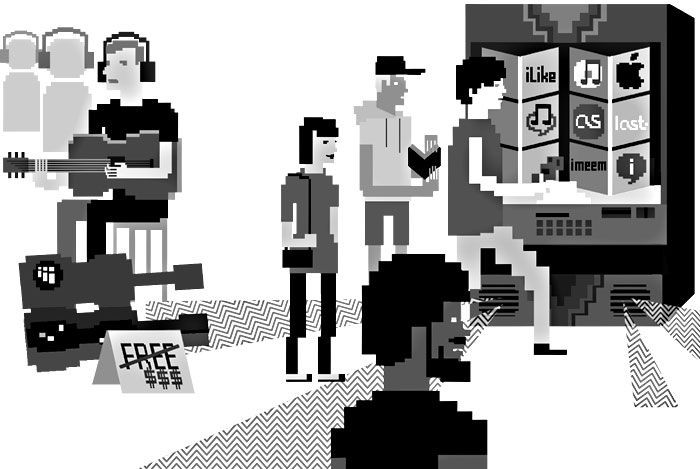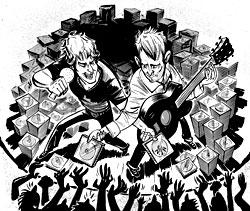According to the results of a groundbreaking study (actually, a phone survey) last year by the Pew Internet & American Life Project, “Bloggers: A Portrait of the Internet’s New Storytellers,” the majority of bloggers write about themselves. In that sense, how different are they from “normal” writers? And how does the process of blogging affect off-line writing?
To research, I sifted through Userlands: New Fiction Writers From the Blogging Underground (Akashic Books, $16.95), edited by Artforum regular Dennis Cooper. “This anthology intends to bring to light some of the new fiction writers who are using the Internet’s labyrinthine array of blogs and personal web pages to expose, test, and develop their work,” says the back cover.
While the ease of producing content with immediate worldwide access helps create a sense of intimacy, it also creates a facile, “churn ‘n’ burn” quality to many of the stories in the anthology. “Patrick” and “letting me out first part” don’t even bother with punctuation. “Return to Zero,” a first-person rant (like most of the stories), boldly proclaims: “The irony is that Britney sucks and we rocked. So what the fuck?!”
One of the best pieces is by a local writer who isn’t actually a blogger—it’s an excerpt from Ablutions: Notes for a Novel, by Bainbridge Island’s Patrick DeWitt. But like many others in the anthology, DeWitt’s drug-and-alcohol-infused story is of a hard-knock life told in a conversational tone. “Ablutions,” or the washing away of sins, shapes an alcoholic’s story through a few possible atonements: “Discuss the new doorman, Bolo, who at the end of the third night on the job accidentally cuts a man’s finger off.” It’s a hypnotic cross between Lorrie Moore and Denis Johnson.
DeWitt, who never attended college and is currently working as a contractor, met Cooper at a wedding a few years ago. Cooper, whose popular blog focuses on topics such as fiction and gay porn, is “notoriously generous to younger writers with his time,” DeWitt says.
DeWitt reads Cooper’s blog now, but doesn’t count himself as a regular blog reader. “The quality varies…and the few I’ve looked at, you can tell that people aren’t that serious because they lose steam. A few weeks go by, and they haven’t updated it.” (Technorati estimates that half of all new bloggers quit their new hobby within three months.) He’s also not sure how he could fit blog writing into his daily routine, which includes a 2-year-old son and a commitment to his off-line writing that allowed him to recently finish a novel. “I’m writing [fiction] every day—I don’t know where I’d find the time.”
To get a sense of the kind of longer book that blogging pros are cranking out, take a look at the titles recently shortlisted for the second annual Lulu Blooker Prize for Blooks, which honors bloggers who make the transition from cyberspace to dead-tree artifacts. (The judges this year include Arianna Huffington, who went in the opposite direction.) Among the six nominees in the fiction category is Rebecca Agiewich’s debut novel, BreakupBabe (Ballantine Books, $13.95), a funny, likable book about a thirtysomething woman rather like Agiewich who deals with a breakup by blogging about it. Agiewich says her original manuscript had excerpts from a blog, but her editor wanted even more.
How did blogging affect her off-line work? “[It] made me feel good about my writing, and made me realize I’d found a topic I was really good at writing about,” says Agiewich, who’ll teach a class on blogging this summer at Hugo House. And the feedback was invaluable. “It really helped me find my voice….It’s this interaction between writer and reader in real time. The comments are often just as interesting, if not more interesting, than the blog itself.”
Rather than splinter her attention, she says, “[Blogging] inspired me and gave me the confidence to write a longer piece of work.” But in a catch-22, because of the loss of anonymity caused by her success, she doesn’t feel comfortable blogging about relationships anymore. “I feel like there’s a bit of a hole in my life,” she jokes.
Many stories in Userlands seem to cross the line between fact and fiction, though this lack of well-researched historical fiction and glut of young, male characters facing 21st-century dilemmas isn’t uncommon among the contemporary fiction of young men. And Agiewich admits that the blogging process has affected the travel journalism that she did in her pre-BreakupBabe days and is currently working on. “It’s hard going from writing the novel, [which] was so easy in a way because I was just writing everything from my own head. There was no research involved. Journalism involves a lot more getting your facts straight and knowing about things other than your own feelings.”
Emoticons notwithstanding, if you read the off-line writing of bloggers, would you see any similarities? It’s tempting to make rote generalizations, but such overwhelmingly large numbers—Technorati now tracks over 70 million blogs; each second, 1.4 blogs are created—necessarily incorporate a variety of tastes. What’s more common amongst blogsters than writing in short blips, perhaps, is simply writing about what’s easiest: themselves.








